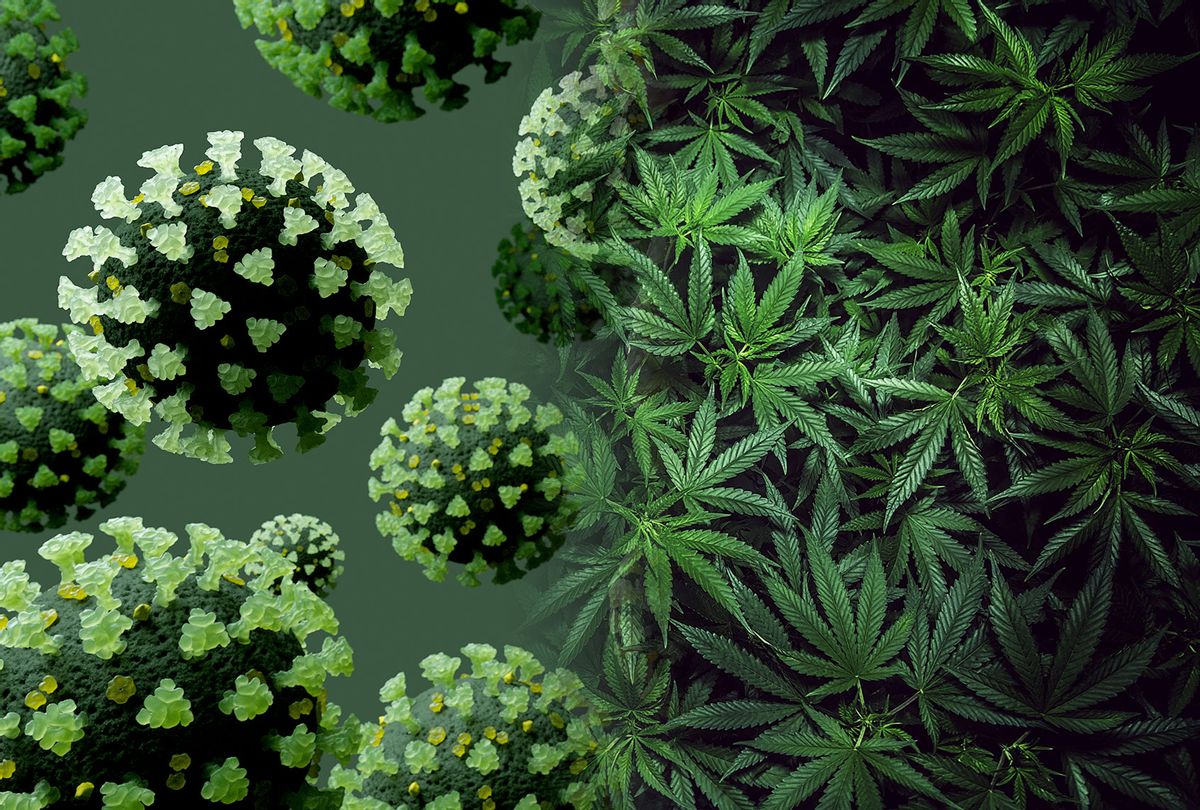When the story first broke that researchers believed marijuana could help treat COVID-19, late night talk show host Jimmy Kimmel cracked a joke that summed up the appeal of — and, from the perspective of scientific literacy, the problem with — the public's reaction to the news.
"You know, it's funny — all these crazy cures, I'm like 'Oh, that's ridiculous.' Ivermectin, the horse dewormer; bleach," Kimmel mused. "And then somebody says marijuana prevents Covid, I'm like 'Oh, really? Do tell.'"
For as long as marijuana has been consumed for recreation, those same casual users have insisted that the plant actually has medicinal value — although those claims have not always been grounded in reliable science. Yet the two recent studies which have asserted marijuana could help treat COVID-19 do not come from activists or crackpots, but prestigious universities and publications: A paper in the journal Science Advances suggests that cannabidiol (CBD), an active ingredient in the cannabis plant, could block COVID-19 infections, while research released in the Journal of Natural Products indicates that cannabigerolic acid and cannabidiolic acid, two compounds found in cannabis, "prevented infection of human epithelial cells" and "prevented entry of live SARS-CoV-2 into cells."
"Importantly, cannabigerolic acid and cannabidiolic acid were equally effective against the SARS-CoV-2 alpha variant B.1.1.7 and the beta variant B.1.351," the study's abstract concludes. "Orally bioavailable and with a long history of safe human use, these cannabinoids, isolated or in hemp extracts, have the potential to prevent as well as treat infection by SARS-CoV-2."
The authors stressed that these products should not be considered as a substitute for vaccinations and public health precautions, but as a potential supplement to them. (Salon reached out with questions about the study to Dr. Richard Van Breemen, a professor at Oregon State University and both the lead and corresponding author on the paper, and has not heard back at the time of this writing.)
RELATED: Condiments with some chill: CBD enters the world of sauces
As for the paper on CBD, Salon spoke with Dr. Marsha Rosner, who took the lead with this study and was one of the senior authors, and additionally is a professor at the University of Chicago.
"We don't know yet if CBD can prevent COVID, but we think our results provide a strong case for a clinical trial — such as those that have been done for vaccines — to determine whether CBD is effective either for prevention or potentially for decreasing COVID infection in people," Rosner told Salon. That said, there are some caveats. First, as with the authors of the Science Advances study, Rosner emphasized that no marijuana products are a substitute for vaccination. For another thing, the drug would need to have such a high purity that the products at your local dispensary or other commercial location would almost certainly not be enough, and even then would have to be stored in such a way that it does not break down. In the current market, "there really is no quality control."
Want more health and science stories in your inbox? Subscribe to Salon's weekly newsletter The Vulgar Scientist.
Rosner also argued that "to date, CBD is the only cannabis compound that should be seriously considered as a potential drug to fight COVID" and mentioned that in the Science Advances paper they found special CBD formulations inhibited SARS-CoV-2 replication in cultured cells at doses that are also found in human blood; that CBD can decrease SARS-CoV-2 amounts in mouse lung and nasal passages; and that they had a lower incidence of positive COVID results among patients who took a prescribed, FDA-approved CBD formulation. "Our results do NOT mean that CBD will work as an anti-viral agent," Rosner explained. "Instead, they provide strong support for a clinical trial to definitively determine whether pure CBD, taken with the appropriate dose and formulation, is effective at preventing or decreasing SARS-CoV-2 infection.
Dr. Russell Medford, chairman of the Center for Global Health Innovation and Global Health Crisis Coordination Center, told Salon by email that people should exercise caution before reading too much into the results.
"It is important to manage expectations regarding these very early laboratory and animal studies demonstrating an effect of CBD on SARS-CoV-2," Medford explained. "These findings should not be used to assume that CBD will work to curb COVID-19 in patients. As is the case for any potential therapeutic that shows efficacy in the laboratory or animal models, this will require extensive additional laboratory, animal and eventually clinical studies."
Medford added, "It is important to note the many other potential COVID treatments, such as hydroxychloroquine to name just one, showed promise in the laboratory but failed to show any benefit in clinical trials of patients."
Dr. Peter Lurie, a former associate commissioner at Food and Drug Administration (FDA) and President of the Center for Science in the Public Interest, echoed Medford's observation.
"What you have are studies that are interesting and might suggest pathways for future research, but they are not sufficient to convince a regulatory agency of the product's effectiveness or, in my mind, enough to justify prescribing to patients," Lurie told Salon. He later specified that "the FDA would not accept these two studies as adequate evidence of effectiveness. I cannot imagine them doing so." Like Medford, he mentioned the hype about hydroxychloroquine as an example of a potential medicine that "looked promising in epidemiological studies" but proved ineffective in later studies.
Update: This article was updated with an additional quote from Dr. Marsha Rosner since its initial publication.
Read more on cannabis and science:



Shares